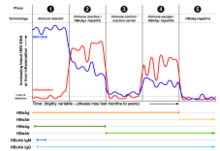
In immunology, seroconversion is the development of specific antibodies in the blood serum as a result of infection or immunization, including vaccination.[1][2] During infection or immunization, antigens enter the blood, and the immune system begins to produce antibodies in response. Before seroconversion, the antigen itself may or may not be detectable, but the antibody is absent. During seroconversion, the antibody is present but not yet detectable. After seroconversion, the antibody is detectable by standard techniques and remains detectable unless the individual seroreverts, in a phenomenon called seroreversion, or loss of antibody detectability, which can occur due to weakening of the immune system or decreasing antibody concentrations over time. Seroconversion refers the production of specific antibodies against specific antigens, meaning that a single infection could cause multiple waves of seroconversion against different antigens. Similarly, a single antigen could cause multiple waves of seroconversion with different classes of antibodies. For example, most antigens prompt seroconversion for the IgM class of antibodies first, and subsequently the IgG class.[3]
Seroconversion rates are one of the methods used for determining the efficacy of a vaccine. The higher the rate of seroconversion, the more protective the vaccine for a greater proportion of the population. Seroconversion does not inherently confer immunity or resistance to infection. Only some antibodies, such as anti-spike antibodies for COVID-19, confer protection.[4]
Because seroconversion refers to detectability by standard techniques, seropositivity status depends on the sensitivity and specificity of the assay. As a result, assays, like any serum test, may give false positives or false negatives and should be confirmed if used for diagnosis or treatment.[5]
- ^ "Seroconversion". Webster's New World College Dictionary, 4th Edition. 2010. Archived from the original on 30 April 2021.
Immunology: the process of producing antibodies in response to a specific antigen
- ^ Stöppler MC. "Medical Definition of Seroconversion". MedicineNet. Archived from the original on 10 February 2021.
Seroconversion: The development of detectable antibodies in the blood that are directed against an infectious agent. Antibodies do not usually develop until some time after the initial exposure to the agent. Following seroconversion, a person tests positive for the antibody when given tests that are based on the presence of antibodies, such as ELISA.
- ^ Cite error: The named reference
AlbertsJohnson20022was invoked but never defined (see the help page). - ^ Cite error: The named reference
:17was invoked but never defined (see the help page). - ^ Cite error: The named reference
:18was invoked but never defined (see the help page).